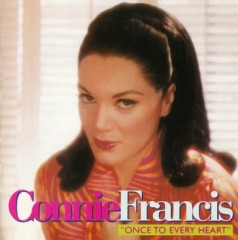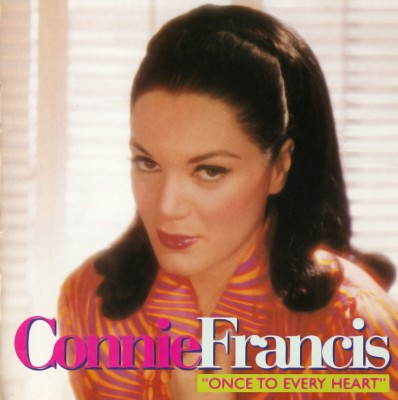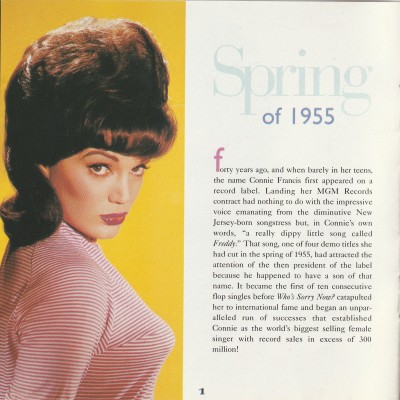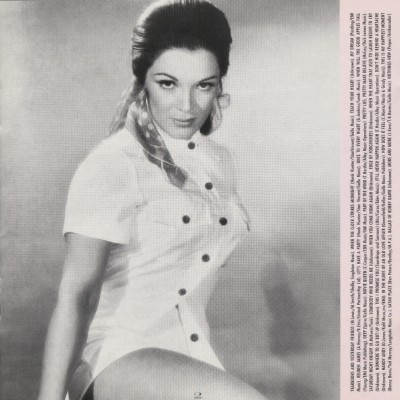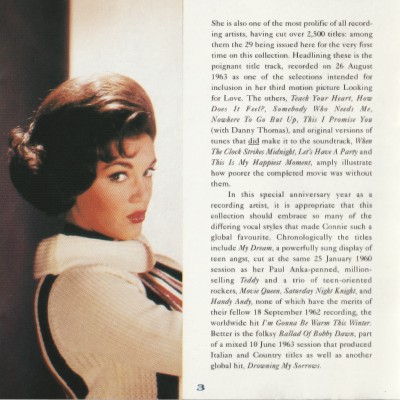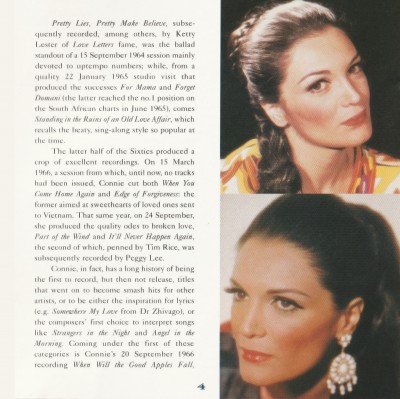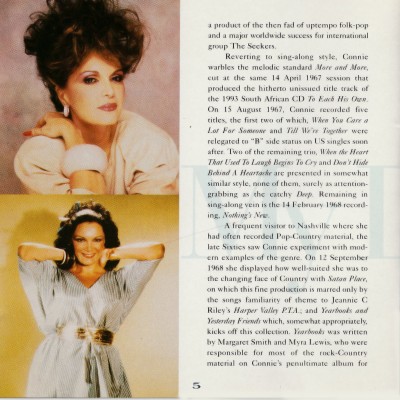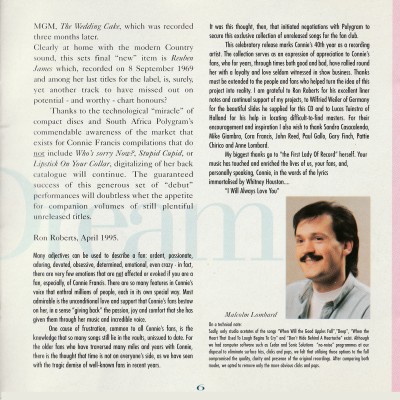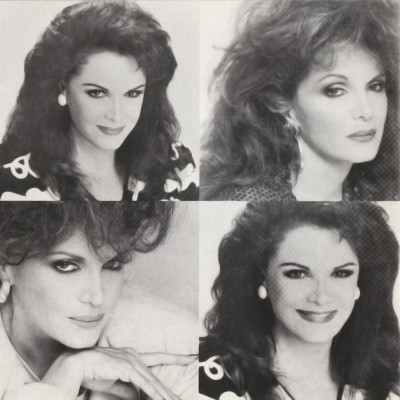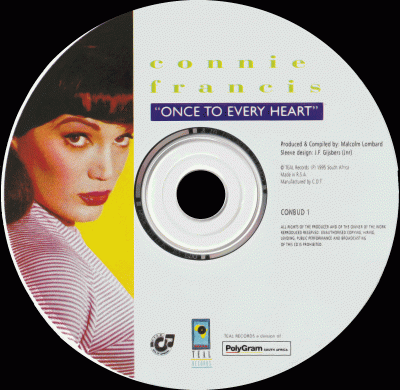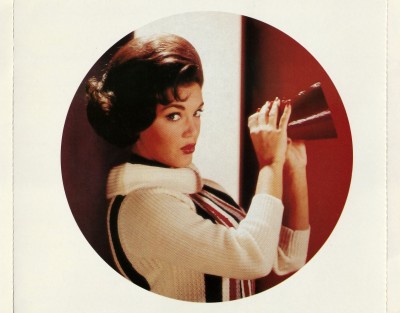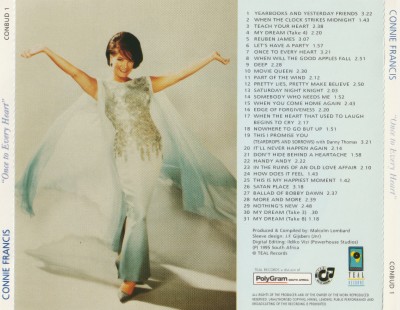ONCE TO EVERY HEART
Forty years ago, and when barely in her teens, the name Connie Francis first appeared on a record label. Landing her MGM Records contract had nothing to do with the impressive voice emanating from the diminutive New Jersey-born songstress but, in Connie's own words, "a really `dippy' little song called Freddy." That song, one of four demo titles she had cut in the spring of 1955, had attracted the attention of the then president of the label because he happened to have a son of that name. It became the first of 10 consecutive flop singles before Who's Sorry Now? catapulted her to international fame and began an unparalleled run of successes that established Connie as the world's biggest selling female singer and with record sales in excess of 300 million.
She is also one of the most prolific of all recording artists, having cut over 2,500 titles: among them the 30 being issued for the first time in this collection. Headlining these is the poignant title track. recorded on 26 August 1963 as one of the selections intended for inclusion in her third motion picture, Looking For Love. The others, Teach Your Heart, How Does It Feel?, Somebody Who Needs Me, Nowhere To Go But Up, This I Promise You (with Danny Thomas), and original versions of tunes that did make it to the soundtrack, When The Clock Strikes Midnight, Let's Have A Party and This Is My Happiest Moment, amply illustrate how much the poorer the completed movie was without them.
In this special anniversary year as a recording artist, it is appropriate that this collection should embrace as many of the differing vocal styles that made Connie such a global favourite. Chronologically, the titles include My Dream, a powerfully sung display of teen angst, cut at the same 25 January 1960 session as her Paul Anka-penned, million-selling Teddy, and a trio of teen-oriented rockers, Movie Queen, Saturday Night Knight, and Handy Andy, which, though fun, do not have the merits of their fellow 18 September 1962 recording, the worldwide hit I'm Gonna Be Warm This Winter. Better is the folksy Ballad Of Bobby Dawn, part of a mixed 10 June 1963 session that produced Italian and Country titles as well as another global success, Drowning My Sorrows.
Pretty Lies, Pretty Make Believe, subsequently recorded, among others, by Ketty Lester of Love Letters fame, was the ballad standout of a 15 September 1964 session mainly devoted to up-tempo numbers; while, from a quality 22 January 1965 studio visit that produced the successes For Mama and Forget Domani, comes Standing In The Ruins Of An Old Love Affair, which recalls the beaty, sing-along style so popular at the time.
The latter half of the Sixties produced a crop of excellent recordings. On 15 March 1966, a session from which, until now, no tracks had been issued, Connie cut both When You Come Home Again and Edge Of Forgiveness; the former, in typical heartfelt style, aimed at sweethearts of loved ones sent to Vietnam. That same year, on 24 September, she produced the quality odes to broken love, Part Of The Wind and It'll Never Happen Again, the second of which, composed by Tim Hardin, was subsequently recorded by Peggy Lee.
Connie, in fact, has a long history of being the first to record, but then not release, titles that went on to become smash hits for other artists, or to be either the inspiration for lyrics (eg Somewhere My Love from Dr Zhivago) or the composers' first choice to interpret songs like Strangers In The Night and Angel In The Morning. Coming under the first of these categories is her 20 December 1966 recording When Will The Good Apples Fall?, a product of the then current fad of up-tempo folk-pop, which became a major worldwide success for chart-topping group The Seekers.
Reverting to sing-along style, Connie warbles the melodic standard More And More, cut at the same 14 April 1967 session responsible for the hitherto unissued title track of the 1993 South Africa CD To Each His Own (Polydor MMTCD 1831). On 15 August 1967 she recorded five titles, the first two of which, When The Heart That Used To Laugh Begins To Cry and Don't Hide Behind A Heartache are presented in somewhat similar style - none of them, surely, as attention-grabbing as the catchy Deep.
Remaining in sing-along vein is Nothing's New, joined on this collection by fellow 14 February 1968 title Masquerade which, on spinning, prompts the listener to wonder how it could remain buried in the vaults for a quarter-century.
A frequent visitor to Nashville where she had often recorded pop-Country material, the late Sixties saw Connie experiment with modern examples of the genre. On 12 September 1968 she displayed how well-suited she was to the changing face of Country with Satan Place, a fine production marred only by the song's familiarity of theme to Jeannie C Riley's Harper Valley P.T.A., and Yearbooks and Yesterdays Friends which, somewhat appropriately, provides the opening selection. Yearbooks was written by Myra Smith and Margaret Lewis, who were responsible for most of the rock-Country material on Connie's penultimate album for MGM, The Wedding Cake, which was recorded three months later. Clearly at home with the modern Country sound, this set's final `new' item is Reuben James which, recorded on 8 September 1969 and among her last titles for the label is, surely, yet another track to have missed out on potential - and worthy - chart honours?
Thanks to the technological `miracle' of compact discs, and PolyGram South Africa's commendable awareness of the market that exists for Connie Francis compilations that do not include Who's Sorry Now?, Stupid Cupid or Lipstick On Your Collar, digitalising of her back catalogue will continue. The guaranteed success of this generous set of `debut' performances will doubtless whet the appetite for companion volumes of still plentiful unreleased titles.
Ron Roberts, April 1995





